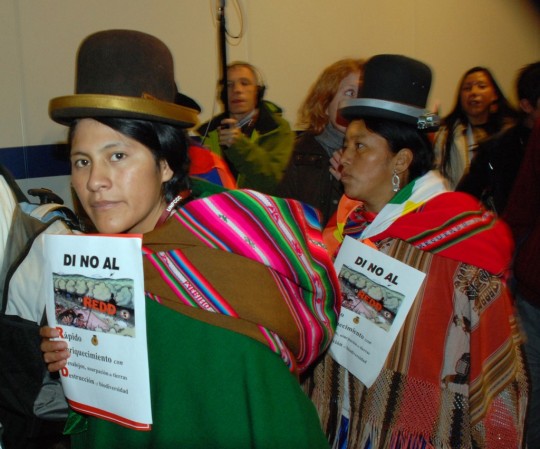Nov 23
201110
Amazon Watch, Avaaz, Carbon Markets | REDD, Conservation International, Democracy Centre, Greenpeace, Nature Conservancy, Non-Profit Industrial Complex, The International Campaign to Destabilize Bolivia, World Wildlife Fund (WWF)
U.S. Funded Democracy Centre Reveals It’s Real Reason for Supporting the TIPNIS Protest in Bolivia: REDD $$$
November 23rd, 2011
by Cory Morningstar

“Bolivia is and will remain a country who desperately struggles to resist Imperialism and fight for their autonomy – against all odds.”
The Democracy Centre, Avaaz and Amazon Watch are the main three NGOs, heavily funded by U.S. interests (Rockefellers, David and Lucile Packard Foundation, Ford Foundation and Soros to name a few), who led the recent International campaign in which they denounced and demonized Bolivian Indigenous leader Evo Morales and his government. This destabilization campaign focused on the TIPNIS protests. A violent confrontation between TIPNIS protestors (influenced/funded by U.S. NGOs/USAID/CIDOB) and the police was the vital opportunity needed in order to execute a destabilization campaign that the U.S. has been strategically planning for decades. (Declassified Documents Revealed More than $97 Million from USAID to Separatist Projects in Bolivia | Evo Morales Through the Prism of Wikileaks – Democracy in Danger).
A key demand put forward by the TIPNIS protestors were that Indigenous peoples would directly receive financial compensation for ‘offsetting’ carbon emissions. This policy, known as REDD/REDD+ (Reduction of Emissions from Deforestation and Degradation), has been denounced as the commodification and privatisation of the forests by many, including those within the climate justice movements. The ‘People’s Agreement’ created at the World People’s Conference on Climate Change and the Rights of Mother Earth (April 2010) clearly condemned REDD, stating that it violates “the sovereignty of our Peoples.” REDD has been promoted as a mechanism to allow developed countries to continue to pollute while undermining the right for underdeveloped countries to develop their economies. Tom Goldtooth of the Indigenous Environment Network stated unequivocally that “The carbon market solutions are not about mitigating climate, but are greenwashing policies that allow fossil fuel development to expand.”
Morales survived the orchestrated attempt to destabilize his government. No one’s fool, Morales did something completely unexpected that few if anyone had even considered: he granted the Indigenous peoples of the TIPNIS every single demand which the protestors, under foreign/outside influence had sought (although he made clear that on the issue of REDD, the ‘People’s Agreement’ adopted at the World People’s Conference on Climate Change and the Rights of Mother Earth would guide any future decision on this issue). Completely caught off guard by Morales response, and realizing, perhaps for the first time, whose lives would ultimately be affected by the outcomes of the demands, and how, one anxious protestor commented “we’re screwed“.
Video: Manipulation: Indigenous Peoples Alto Xingu-STOP pushing us for REDD (running time: 9:26)
Morales has been a world leader in his vocal opposition to REDD stating that “nature, forests and indigenous peoples are not for sale.” At the opposite end of the spectrum are the foundations (who serve as tax-exempt front groups for corporations and elites) who finance the NGOs who have led the campaign to discredit Morales are most all heavily promoting and investing in REDD. CIDOB is involved in pilot REDD projects funded by the NGO called FAN (Fundación Amigos de la Naturaleza) which is funded by a slew of foreign interest entities/states and corporate NGOs such as USAID, Conservation International, European Union, American Electric Power, BP-Amoco and Dow Chemical‘s partner, The Nature Conservancy. Indeed, when it comes to the world’s most powerful NGOs voicing any dissent to the false solution of REDD, the silence is deafening. (http://www.redd-monitor.org/2011/10/26/manufacturing-consent-on-carbon-trading/)
The money behind the REDD scheme is in the trillions.
Above: Indigenous Peoples Alto Xingu – Stop Pushing Us For REDD – Photo: Rebecca Sommer
It is revealing to note that while the corporate NGOs worked feverishly to shine an International spotlight on the tear-gassing of the TIPNIS protestors by Bolivian police, a slaughter of 100,000 Libyan civilians was underway in an Imperialist, NATO-led invasion under the guise of ‘humanitarian intervention’. This invasion was made possible by the fabrication of events and lies put forward by 78 NGOs. To this day, there is no evidence to back these lies. The NGOs were and remain silent on this latest atrocity as the U.S./Euro Imperialist destabilization campaigns escalate in the Middle East in a race towards global domination.
The Democracy Centre makes clear it’s opposition to the Bolivian Morales government’s position on REDD in its policy statement on REDD drafted by staffer Kylie Benton-Connell [1]
In this report, the Democracy Centre both denies/ignores the involvement of USAID in the CIDOB promoted REDD Amazonia project via its funding to FAN, and argues that “The REDD Amazonia project is important, because it keeps the possibility of these kind of projects alive in Bolivian institutions, in a context where the national government is swimming against the tide of international REDD politics.”
Furthermore, Benton-Connell reiterates the Democracy Centre’s opposition to the Bolivian Morales government’s position and the Centre’s support for REDD in her article published on November 21, 2011 (link below and also published on the Democracy Centre’s website):
” The decision linking forest conservation to carbon markets may well be finalized at the UN climate negotiations in Durban at the beginning of December, unless it is blocked by dissident countries.”
Moreover, Benton-Connell tells us:
“… if today’s Bolivian government or a future one drops its opposition to carbon markets, and an international agreement is reached on trading in forest carbon, revenue streams could become much larger.”
Benton-Connell continues that the problem is not REDD itself, but how REDD is organized. She states:
“The fates of many ordinary people in Bolivia — and of similar communities across the globe — will be in play as technocrats discuss plans for forest carbon trading at the upcoming UN climate negotiations in Durban. As Marcos Nordgren Ballivián, climate change analyst with Bolivian organization CIPCA told us last year: “tensions already exist, and with a new source of profits such as REDD could prove to be, it might cause problems … But we’ll have to see how REDD is organized, because that will define, of course, if these conflicts are worsened.”
The following text appears 8 March 2010 in an article titled Getting REDDy to Cross the Finish Line, Two Decades in the Making: “It’s hard to imagine with all the progress REDD has achieved, that it all started less than 20 years ago with the Rio Summit in ’92, when the makings of a global sustainability architecture in the form of a climate treaty began to take shape. But a forestry treaty had yet to happen … With over 20 years of experience in the forestry sector, Michael Northrup, Program Director of Sustainable Development at the Rockefeller Brothers Fund, was invited by the Pinchot Institute for Conservation to give a Distinguished Lecture, ‘After Copenhagen: Implications for U.S. Climate, Energy, and Forest Policy’ at the high brow, exclusive Cosmos Club. Northrup casually described to the 30 or so people in the room where we are with REDD today and how we got here. Plus he played the “name game” as he knew most of the people in the room.”
Of course, Rockefeller is not alone in its quest to lead and dominate on the promise of “green capitalism”; other members of the elites will not be left behind to feed on the breadcrumbs. For example, The Climate and Land Use Alliance, whose member foundations include the ClimateWorks Foundation (Avaaz partner), the Ford Foundation, the Gordon and Betty Moore Foundation, and the David and Lucile Packard Foundation, and multi-million dollar corporate NGOs – Greenpeace International and Rockefeller’s WWF have joined forces to push forward the false solution of REDD.
“The big business conservationists and their professionals didn’t buy off the movement; they built it.” –Katherine Barkley and Steve Weissman, “The Eco-Establishment“, in: Ramparts (eds.), Eco-Catastrophe, Harper and Row, 1970
Video: President Morales Speaks to Imperialism (UN Gen Ass, Sept 21, 2011)(Running time: 8:02)
Let us close while we reflect upon the words of author Juan Carlos Zambrana Marchetti:
“In the recent conflict over the construction of a highway through the TIPNIS indigenous territory, history repeated itself once again: indigenous people renounced all possibility of progress and integration in favor of the hidden political objective of the US to boycott the projects of crop-substitution and development center in the Chapare, wherein lies the core of the anti-imperialist consciousness of the Bolivian people. Once again, foreign interests have ensured that the Indians act against their own interests. This shows that a priority issue for the new agenda of president Morales should be to continue deconstructing the control mechanisms of the Western powers. “Philanthropy” has always been one of the most dangerous mechanisms.”
For further reading on the International Campaign to Destabilize Bolivia: http://wrongkindofgreen.org/category/the-international-campaign-to-destabilize-bolivia/
[1] Benton-Connell worked with the Democracy Center in Cochabamba, Bolivia from February 2010 to June 2011, where she authored the report “Off the Market: Bolivian forests and struggles over climate change.”




